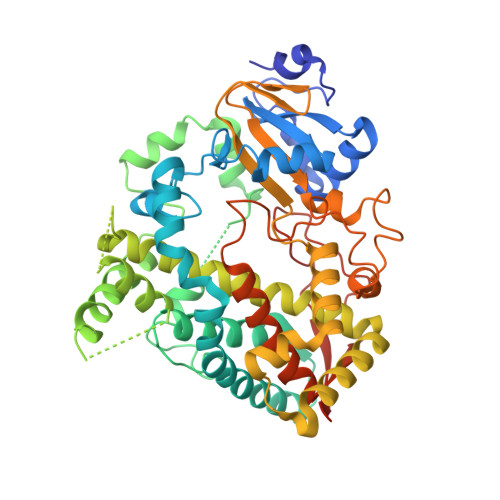An increase in side-group hydrophobicity largely improves the potency of ritonavir-like inhibitors of CYP3A4.
Samuels, E.R., Sevrioukova, I.F.(2020) Bioorg Med Chem 28: 115349-115349
- PubMed: 32044230
- DOI: https://doi.org/10.1016/j.bmc.2020.115349
- Primary Citation of Related Structures:
6UNE, 6UNG, 6UNH, 6UNI, 6UNJ, 6UNK, 6UNL, 6UNM - PubMed Abstract:
Identification of structural determinants required for potent inhibition of drug-metabolizing cytochrome P450 3A4 (CYP3A4) could help develop safer drugs and more effective pharmacoenhancers. We utilize a rational inhibitor design to decipher structure-activity relationships in analogues of ritonavir, a highly potent CYP3A4 inhibitor marketed as pharmacoenhancer. Analysis of compounds with the R 1 side-group as phenyl or naphthalene and R 2 as indole or naphthalene in different stereo configuration showed that (i) analogues with the R 2 -naphthalene tend to bind tighter and inhibit CYP3A4 more potently than the R 2 -phenyl/indole containing counterparts; (ii) stereochemistry becomes a more important contributing factor, as the bulky side-groups limit the ability to optimize protein-ligand interactions; (iii) the relationship between the R 1 /R 2 configuration and preferential binding to CYP3A4 is complex and depends on the side-group functionality/interplay and backbone spacing; and (iv) three inhibitors, 5a-b and 7d, were superior to ritonavir (IC 50 of 0.055-0.085 μM vs. 0.130 μM, respectively).
- Departments of Pharmaceutical Sciences, University of California, Irvine, CA 92697-3900, United States.
Organizational Affiliation:

















